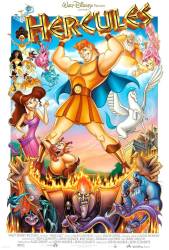Continuity mistake: When the scissors break after the Fates fail to cut Hercules' string of life, the way the scissors are bent changes between shots.
Continuity mistake: After Hercules defeats the hydra his shirt has several rips in it. These rips become larger between shots.
Continuity mistake: At the start of the hydra battle the lines on the ground near Hercules and Phil change between shots.
Continuity mistake: When teen Hercules visits the Temple of Zeus, he is carrying a pack. He drops it on the floor next to him. The Zeus statue then picks him up. When Zeus then places him on the floor, the bag is gone.
Continuity mistake: Teenage Hercules is running with the hay-cart towards an archway. As he runs toward it, we see the arch is higher than the hay. In the next shot, we see the hay is much higher than the arch. Then in the following shot, the hay barely brushes under the arch.
Continuity mistake: When Hercules tries to grab Meg's soul, his hands become very old as soon as they enter the water. But when Hercules is swimming to the bottom of the river, it is quite a while before his hands become old at all.
Continuity mistake: When the hydra sprouts three heads, Phil hands Hercules the sword in his left hand, but in the very next shot the sword is in his right hand.
Continuity mistake: At the end when Hercules comes back to Mt. Olympus, there are two huge lines of gods greeting him on either sides of a long staircase. After Zeus and Hera have talked to him, about ten gods start mobbing him. When the shot cuts back to Meg the staircase is empty. Where did all the other gods go?
Continuity mistake: In the scene where the gods are chained up and being led away, they keep changing places in between shots.
Continuity mistake: In the shot where Hercules breaks Apollo's and Aphrodite's chains, the chain links are connected between their wrists. However in earlier shots, the chains were from the wrists to the neck.
Continuity mistake: When Amphitryon finds the baby and looks at his medal, the word "Hercules" is written on one side. Later, older Hercules is talking to his parents, and his mother takes out the same medal to show to him. Look closely, and you will see that the word "Hercules" is gone.
Continuity mistake: When Hercules is shaking Phil's hand, the two move away from the nearby tree between shots.
Continuity mistake: Inside the temple of Zeus, there is a huge ceramic design on the floor. But toward the end of this scene, the design has shrunk by an insane amount.
Continuity mistake: After failing to kill Hercules, Panic says "Hades is gonna kill us when he finds out what happened". In this shot, Pain's tail is wrapped around his side twice. In the next shot, when Pain replies "You mean IF he finds out", his tail is wrapped around thrice.
Continuity mistake: When Hercules' parents show him the medal, in one shot he is holding it with his fingers, but in the next it is lying in his palm.
Continuity mistake: During Hades' meeting with the Fates, he creates a figurine of baby Hercules and puts it on the table. After the Fates reveal part of the future to Hades and fly away, in an overhead shot the figurine is gone.
Continuity mistake: During the battle against the hydra, the hydra makes very distinctive scrapes on the ground with its teeth. After the battle, there is an overhead shot of the valley, and the scrapes are gone.
Continuity mistake: In the scene near the end when Hercules returns to Mt. Olympus, many of the gods are shown at different locations on the stairs between shots.
Continuity mistake: In the shots of the pot-maker closing the curtain of his shop and of the kid asking Hercules for his Frisbee back, the pots in the background change between shots.
Continuity mistake: When Hephaestus is hammering the lightning bolt on the table, the position of the bolt changes between shots.






Answer: They went on with their lives without Hades' abuse.
MasterOfAll